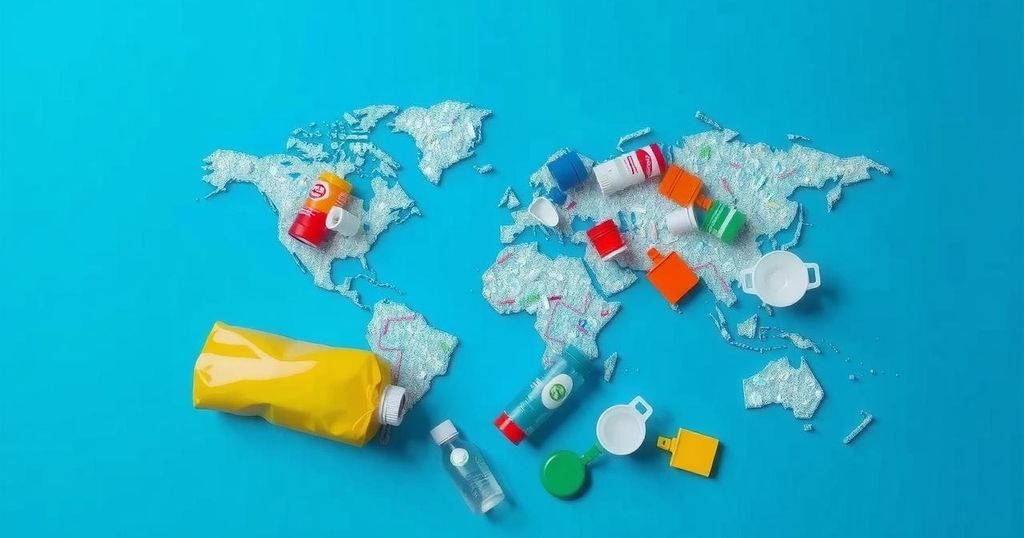Countries participating in the UN negotiations on plastic pollution in Busan, South Korea, voiced concern over the obstruction by a minority, primarily oil-producing nations. Delegates are striving for an ambitious treaty to curb plastic pollution but face disagreements on essential targets and measures. With significant stakes at play, the outcome of these discussions will impact global pollution reduction efforts, as notable contributors such as China and the U.S. have yet to engage meaningfully in the negotiations.
During the fifth session of the UN Intergovernmental Negotiating Committee on Plastic Pollution (INC-5) held in Busan, South Korea, numerous nations have expressed concerns regarding the obstructionist stance of certain countries that hinder progress towards establishing a robust global treaty aimed at reducing plastic pollution. Delegates indicated that a group mainly composed of oil-producing nations has exhibited resistance to compromising on essential issues, such as setting plastic production reduction targets and phasing out hazardous chemicals. France’s Minister Delegate for Energy, Olga Givernet, emphasized the urgency of achieving an ambitious agreement, underscoring the continued obstruction. With plastic production projected to triple by 2060 and more than 90% of plastic being unrecycled, the stakes are high. However, disagreements persist on how to address the plastic crisis effectively. Countries like Saudi Arabia and Russia advocate for a treaty focused exclusively on waste management without imposing binding regulations. Rwanda’s Juliet Kabera and Fiji’s Sivendra Michael have criticized the obstruction, with Kabera stressing the importance of not permitting a compromise that lacks enforceability. The most recent draft of the treaty reflects the existing divisions among member states and has encountered multiple delays. Concerns abound that negotiations may collapse without reaching consensus, while representatives highlight the necessity of all nations’ participation to ensure the treaty’s effectiveness. Mexico’s Camila Zepeda remains hopeful for consensus, as over 100 countries support production reduction targets, though vital contributors such as China and the United States have not actively participated in talks. Panama’s Juan Carlos Monterrey Gomez warned that failing to secure an ambitious treaty would result in historical repercussions.
Amidst these discussions, the fate of the treaty remains uncertain as representatives encourage continued dialogue to address the significant challenges posed by plastic pollution.
The time sensitivity of the negotiations further compounds the urgency to finalize an agreement that reflects the collective commitment of the international community to tackle this pressing environmental issue.
The negotiations at the INC-5 session address a critical global challenge: plastic pollution, which poses significant risks to environmental and human health. With projections suggesting that plastic production could triple by 2060 and with recycling rates remaining below 10%, the need for an effective international treaty is paramount. This treaty aims to establish enforceable targets for reducing plastic production and phasing out harmful chemicals, amid rising awareness of the long-term consequences of plastic waste. However, discussions have been marred by differences in priorities, particularly between oil-producing nations advocating for minimal regulatory commitments and other countries seeking more comprehensive measures to combat plastic pollution. The backdrop of these talks includes urgent calls from environmental groups and a growing consensus among numerous nations regarding the necessity of ambitious goals.
In conclusion, the ongoing negotiations in Busan concerning the global treaty to address plastic pollution face significant hurdles due to the obstructionist tactics employed by a minority of nations. As the deadline approaches, the potential for a consensus remains, yet the risk of a weakened treaty looms large. The emphasis among various delegates on the need for meaningful commitments underscores the collective desire to forge a robust framework capable of effectively mitigating plastic pollution. The international community’s ability to reach an agreement that balances the interests of all parties will ultimately determine the future of global efforts to address this urgent environmental crisis.
Original Source: jordantimes.com






